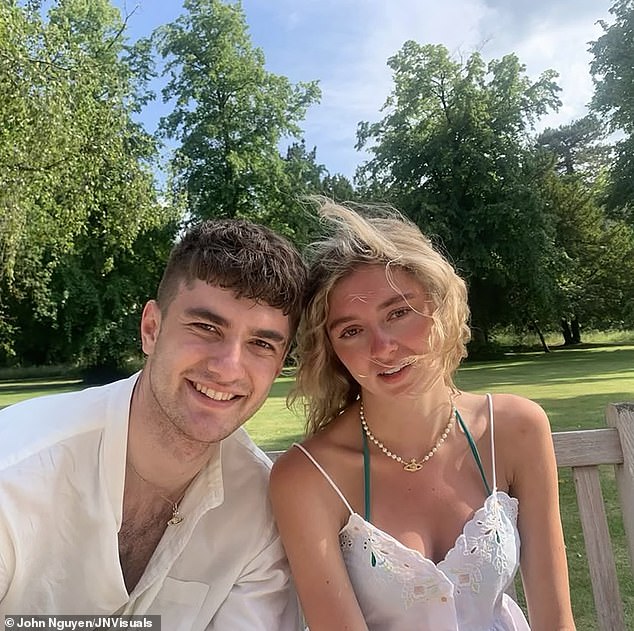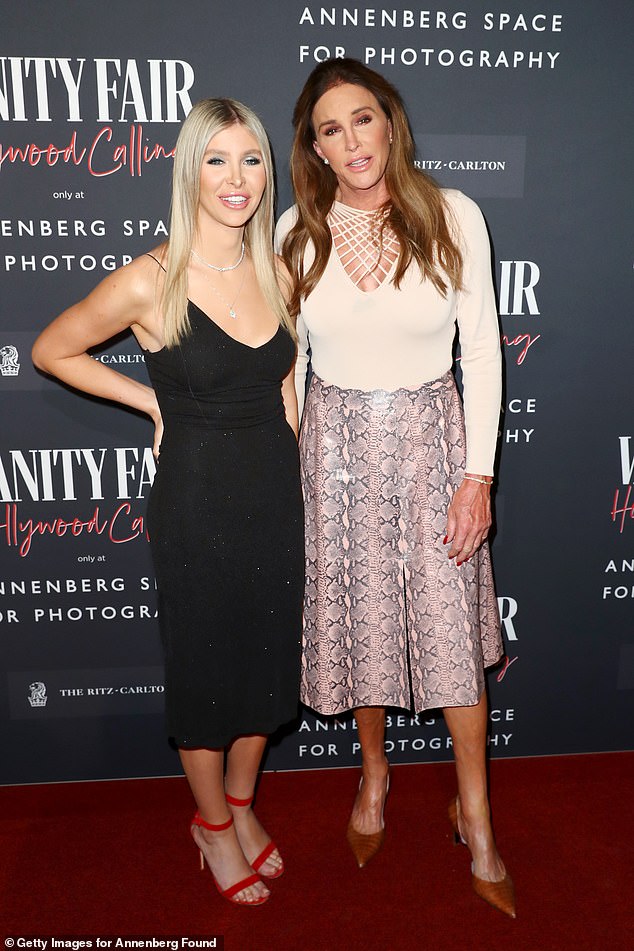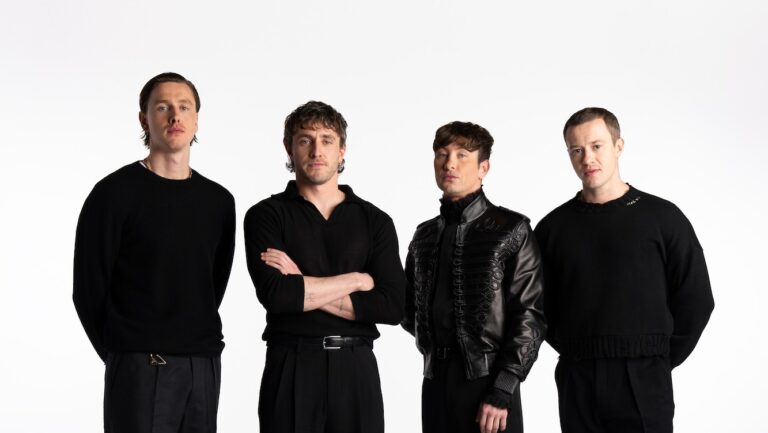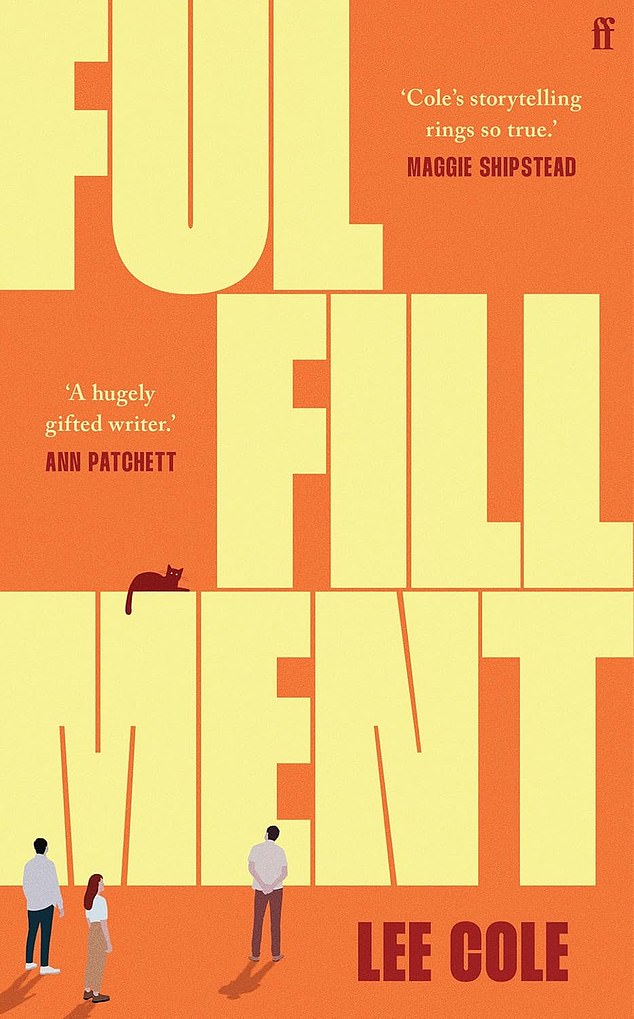Paloma Shemirani was one minute younger than her twin brother, Gabriel – more mature than him, he claims, but as endearingly awkward.
‘I’ve always been told I was like her in male form,’ smiles Gabriel, 24. ‘She was pretty, obviously, but she was also a bit of a nerd.’
They used to make each other laugh by repurposing rap lyrics as Shakespearean sonnets.
Being a twin meant Gabriel didn’t feel alone. ‘You never relate to yourself as an individual. The whole existential conception of myself came from that,’ he explains.
So when Cambridge graduate Paloma died of the cancer non-Hodgkin lymphoma last July, aged 23, his entire identity was called into question. ‘You feel you’ve lost half of yourself. It feels I’m never going to find it again.’
Yet Gabriel’s grief is compounded by anger, because he believes his sister would still be alive were it not for one woman: their mother, Kate Shemirani.
A notorious conspiracy theorist, Kate – who called Covid a ‘lie’ and accused nurses administering the Covid vaccine of ‘genocide’ – did not want her daughter to have chemotherapy, which doctors had told Paloma would give her an 80 per cent chance of recovery.
Paloma, vulnerable under Kate’s care, eschewed it for a juice diet – for which there is, unsurprisingly, no evidence to support it curing cancer.
‘She was dead within seven months,’ says Gabriel, who calls Kate by her real name, Kay. ‘Without a shadow of a doubt, Kay sacrificed my sister on the altar of her ideology.’

Gabriel with his twin sister Paloma, who died of cancer last year after refusing treatment
Last week, a Panorama investigation revealed how Kate’s conspiracy theories cut to the heart of her family. Today, in his first newspaper interview, Gabriel, who has an older brother Sebastian, 26, and a younger sister the Mail is not naming, lays bare their traumatic upbringing that he believes culminated in his sister’s death.
When we meet, Gabriel, a maths and economics student at the London School of Economics, is still hurting but determined to stop more people falling prey to conspiracy theories.
Research shows they have risen in recent years, thanks to social media, the pandemic and political unrest – all of which Kate, 60, used to her advantage. ‘She’s very malicious,’ he says. ‘Her beliefs are based on what makes her feel better, more important.’
On paper the Shemirani family had a privileged, middle-class lifestyle. Kate’s husband Faramarz, 63, was a quantitative analyst, while she largely remained home to raise their four children in Uckfield, East Sussex.
Yet Gabriel always knew something wasn’t quite right. Faramarz, who moved to Britain from Iran in the 1970s, was susceptible to conspiracy theories, believing the US government was behind the 9/11 attacks. Gabriel says Kate realised such theories were a way ‘to feed her narcissistic personality complex’.
The daughter of a postman and bookkeeper, he says she changed her name because she thought Kay ‘sounded too working-class’. ‘I remember her telling me: ‘I used to train myself not to speak with a Midlands accent,’ ‘ says Gabriel, who recalls Kate keeping ‘a pathological’ 12 cats as pets ‘because she loved having stuff under her control’.
Kate used conspiracy theories to control her children. She wouldn’t let them wear suncream, claiming it caused cancer, or use fluoride toothpaste. ‘She’d shout at us if we drank water from the tap. We had to distil it. She thought ‘they’ were fluoridating the water,’ says Gabriel. ‘She called us all leeches.’
Sebastian and Gabriel were told to read The David Icke Guide To The Global Conspiracy (And How To End It) by the ex-TV presenter, which theorises that the world is controlled by a hidden elite and claims the Royal Family are shape-shifting lizards.

Kate Shemirani has blamed the NHS for her daughter’s death
‘If your parents are saying it’s true, you think: ‘I guess it might be true then,’ ‘ says Gabriel. ‘You don’t realise so much when you’re younger because your childhood is narrated through your parents. It’s only when you look back later you realise they’ve always been nuts.’
Although Kate registered as a nurse in the 1980s, Gabriel said the only work he was aware of her doing in his lifetime was administering Botox. Yet she made nursing ‘part of her personality’. He says the image of being ‘an all-saving nurse’ appealed to her.
In 2012, Kate was diagnosed with breast cancer. Although she had a mastectomy, she refused chemotherapy and credited remaining ‘cancer-free’ to following Gerson therapy – an unproven, natural ‘cancer cure’ that involves drinking juices and administering coffee enemas to detoxify the liver.
Kate’s survival appears to have radicalised her. She started to espouse the benefits of alternative cancer therapy, selling £195 consultations and personal programmes and an annual £69.99 membership fee for her services.
Gabriel says she prioritised her obscure supplements over providing a healthy diet for the children, who existed largely on rice, yoghurt and ketchup.
‘She’d shout at me for eating. She’d say: ‘You’re eating too much,’ ‘ says Gabriel, who is now 6ft 6in but back then ‘was quite underweight’. He says for Paloma, their mother’s obsession with food was ‘especially difficult’. At 5ft 5in, she hovered at an underweight 7st 7lb.
Paloma tolerated some of Kate’s theories, such as fluoride toothpaste being bad for them, because she didn’t want to cause a fuss. And whereas Gabriel found the gifts she would buy to make amends after calling them ‘every name under the sun’ manipulative, Paloma was more inclined to believe Kate was ‘actually sorry’.
He says Paloma was ‘always wanting her love’. If Kate did tell Gabriel she loved him, he doesn’t remember it. ‘You feel permanently attacked.’

Paloma Shemirani studied Portuguese and Spanish at the University of Cambridge
In 2014, she and Faramarz split. For a year Paloma, who won a scholarship to prestigious girls’ school Roedean in Sussex, lived with her father nearby – for which Kate branded her a ‘gold-digger’, says grammar school-educated Gabriel. He says Kate’s willingness to send Sebastian to Eton for his A-levels epitomised the stark contradiction in her values: ‘She claimed the elite were controlling the world but had no problem sending her son on an academic scholarship to Eton.’
Gabriel ‘probably’ stopped loving Kate when he was 17. ‘I had to mourn the death of a mother I realised I can’t emotionally rely on.’
In September 2019, Paloma started a degree in Portuguese and Spanish at Cambridge University, where Gabriel frequently visited her. He shows me a picture of the pair beaming at Grantchester Meadows, where they had been swimming in the River Cam. Paloma was happy with her boyfriend, Ander, and felt ‘free, integrating into normal life’, says Gabriel. ‘She used fluoride toothpaste, drank tap water.’
When the pandemic began the following March, Gabriel says his mother sensed a golden opportunity. Espousing ever more extreme views online, Kate used her growing social media presence to claim there was no pandemic. At anti-lockdown rallies, she compared NHS staff administering vaccines to Nazi war criminals and referred to the NHS as ‘the new Auschwitz’.
After a horrified Gabriel discovered his mother had amassed 40,000 YouTube followers, his brother Sebastian contacted the BBC’s disinformation and social media correspondent, Marianna Spring, and warned in an interview in October 2020: ‘It’s only a matter of time before . . . somebody acts on the bad advice that she is giving the country.’
In response, Gabriel says Kate texted him an accusatory message that read: ‘You’re Judas. You sold me out for 20 pieces of silver.’
‘Interestingly,’ he adds, ‘if you’re the Judas, she’s Jesus, which tells you how messianically she sees herself.’
When Gabriel told his mother he had been vaccinated against Covid, she told him he disgusted her. Paloma didn’t have the vaccination: ‘I think she realised between term times she had to live with my mum.’

Piers Corbyn and Kate Shemirani protest against the Covid-19 vaccination programme in Trafalgar Square in 2021
In October 2020, Kate was removed from Twitter (now X) for violating rules on spreading Covid misinformation. In May 2021, she was struck off by the Nursing and Midwifery Council for spreading Covid misinformation contrary to public health guidance. After Paloma graduated from Cambridge in 2023, she moved in with a friend and found work for a yachting company. Not in contact with her mother at the time, she was, says Gabriel, ‘really happy’.
But that October she felt pains in her back. She had a biopsy at Maidstone Hospital in Kent, before travelling to Sweden to spend Christmas with Ander.
On December 22 she was called back to hospital, where she was diagnosed with non-Hodgkin lymphoma. A shaken Gabriel took solace in the fact Paloma was told by doctors that if she had chemotherapy, her chances of survival were 80 per cent.
Yet a vulnerable Paloma had called Kate, who came to the hospital and persuaded her daughter to go home with her two days later. A text message from Kate to 23-year-old Ander, screened on Panorama, read: ‘TELL PALOMA NOT TO SIGN [OR] VERBALLY CONSENT TO CHEMO OR ANY TREATMENT.’
‘Obviously Kay got to her,’ says Gabriel. He asked Paloma if he could meet her, but she told him their mother had said he wasn’t allowed in the house. Kate had also persuaded Paloma not to leave the house because the air would harm her health.
A former partner of Kate’s told Paloma the 80 per cent recovery rate with chemotherapy was ‘exaggerated’. Paloma decided she wanted to follow Gerson therapy for six weeks.
With Gabriel effectively cut off, he found out from Ander she had refused chemotherapy: ‘I went from [thinking] ‘my sister’s going to survive’, to ‘my sister’s going to be dead imminently’.’
He believes Kate was inspired by Australian wellness influencer Belle Gibson, who falsely claimed dietary changes cured terminal brain cancer that she didn’t have – and whose story was turned into the Netflix series Apple Cider Vinegar last year. ‘Kay saw this as her opportunity to model Paloma as [Belle], thinking: ‘If this works, I’m going to be famous.’ ‘

Gabriel, Paloma and brother Sebastian in 2006. Gabriel described how his mother’s conspiracy theories shaped his childhood, including being banned from drinking tap water or using fluoride toothpaste
Gabriel reported what he describes as a ‘safeguarding issue’ to East Sussex Social Services last February. ‘I wanted her removed from my mum’s care.’
But he didn’t hear back from them for weeks: ‘They never went to visit her in person. They only spoke to her over the phone. In their notes they even say ‘she says her mother’s in the room’.’
When approached by the Mail, East Sussex Social Services declined to comment.
Last April, Gabriel launched a court action to determine whether Paloma was receiving appropriate care, arguing she couldn’t exercise her capacity to make decisions regarding her treatment because she was under the influence of their mother.
He put his degree on hold for a year to make time for the case. He says: ‘This woman’s beliefs were killing my twin sister. There’s nothing I’m not going to do to stop my sister dying.’
But such efforts were cut short by Paloma’s death.
Last May, Paloma posted on Instagram that she was ‘feeling better than ever’. But on July 19 she suffered a cardiac arrest caused by her cancer. She was on life support for five days.
On July 30, Gabriel’s lawyer called to tell him Paloma had died at Royal Sussex County Hospital nearly a week before. He left work ‘in shock’ before breaking the news to Sebastian. He compares his grief to ‘being burnt alive’.

In May 2021, Kate Shemirani was struck off by the Nursing and Midwifery Council for spreading Covid misinformation contrary to public health guidance
Faramarz, now living in Germany, has taken Kate’s side. That his parents withheld Paloma’s death for days feels unfathomable.
Gabriel called Kate that day for confirmation. ‘I said: ‘Is Paloma dead?’ She said: ‘Who told you that?’ as if I’m crazy. She liked the fact that she had information and I didn’t. That was the last time I ever spoke to her. The last time I will ever speak to her.’
Kate kept Paloma’s funeral secret from her sons. Gabriel instead held a memorial service for his twin, with 170 mourners, at Cambridge’s Selwyn College last October.
After Paloma’s death, he had nightmares about her choking: ‘I wouldn’t be able to do anything. It would be a horrible feeling of, ‘If I don’t do something she’s going to die’.’
Next month an inquest into Paloma’s death is due to be held, after which Gabriel hopes to pursue a medical negligence case against Kate – who was reinstated on X after Elon Musk bought the site in 2022.
When approached by the Mail for comment, Kate provided a 682-word statement, on the condition that it was used in its entirety. When told, because of space limitations, we were unable to publish it in full, she withdrew her consent for it to be used.
Since Gabriel and Sebastian first spoke out about Paloma’s death, she has repeatedly denied their claims.
In a statement released on X last week she said that Paloma made her own medical decisions, was not influenced by her parents, ‘did not have a confirmed lymphoma diagnosis’ and died ‘following a chain of gross medical failings, breaches of consent law, falsified medical records, and reckless emergency drug use’.
She added that: ‘Paloma was never ‘coerced.’ She was never ‘radicalised.’ She was a woman of conviction and clarity.’
Meanwhile, Gabriel wants the Online Safety Bill to offer more protection against harmful content as well as changes to control and coercion laws that ‘aren’t fit for purpose’.
In a recent dream, Paloma asked him how he remembered her. ‘I start crying and say: ‘I listen to music that reminds me of you,’ which is big for me because I couldn’t say any final words to her.’
Now his sister’s story has been heard, he says: ‘I can finally start to grieve.’
- Panorama: Cancer Conspiracy Theories: Why Did Our Sister Die? is on BBC iPlayer now. The Marianna in Conspiracyland 2 podcast is on BBC Sounds.








